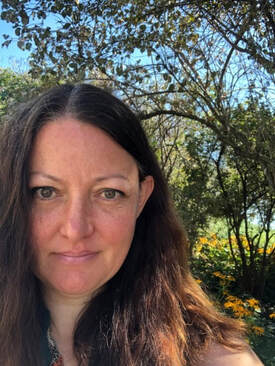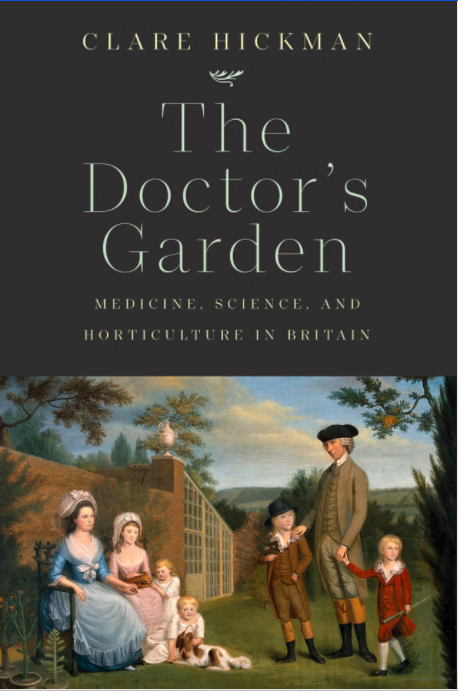The Doctor's Garden: Medicine, Science, and Horticulture in Britain
by Dr. Clare Hickman
As Britain grew into an ever-expanding empire during the late eighteenth and early nineteenth centuries, new and exotic botanical specimens began to arrive within the nation’s public and private spaces. Gardens became sites not just of leisure, sport, and aesthetic enjoyment, but also of scientific inquiry and knowledge dissemination. Medical practitioners used their botanical training to capitalize on the growing fashion for botanical collecting and agricultural experimentation in institutional, semi-public, and private gardens across Britain.
This book highlights the role of these medical practitioners in the changing use of gardens in the late Georgian period, marked by a fluidity among the ideas of farm, laboratory, museum, and garden. Placing these activities within a wider framework of fashionable, scientific, and economic interests of the time, historian Clare Hickman argues that gardens shifted from predominately static places of enjoyment to key gathering places for improvement, knowledge sharing, and scientific exploration.
Click Here to Purchase
by Dr. Clare Hickman
As Britain grew into an ever-expanding empire during the late eighteenth and early nineteenth centuries, new and exotic botanical specimens began to arrive within the nation’s public and private spaces. Gardens became sites not just of leisure, sport, and aesthetic enjoyment, but also of scientific inquiry and knowledge dissemination. Medical practitioners used their botanical training to capitalize on the growing fashion for botanical collecting and agricultural experimentation in institutional, semi-public, and private gardens across Britain.
This book highlights the role of these medical practitioners in the changing use of gardens in the late Georgian period, marked by a fluidity among the ideas of farm, laboratory, museum, and garden. Placing these activities within a wider framework of fashionable, scientific, and economic interests of the time, historian Clare Hickman argues that gardens shifted from predominately static places of enjoyment to key gathering places for improvement, knowledge sharing, and scientific exploration.
Click Here to Purchase
“This book is a very original and accomplished work of garden history, exploring the British eighteenth-century doctor’s garden as an important and neglected site of knowledge creation and dissemination.”—Jonathan Reinarz, author of Past Scents: Historical Perspectives on Smell
“This beautifully written book illuminates our understanding of gardens as centers of medical teaching and research, as sources of experimentation, as places of sociability, and as productive spaces.”—James Beattie, co-editor of the Routledge Research on Gardens in History series, and Chair, Garden History Research Foundation
“In this innovative, impressive book Clare Hickman eschews the traditional focus on the grounds of the landed rich, casting a mass of new light on a rather different range of eighteenth-century gardens. Readable, thought-provoking, and extraordinarily well-researched.”—Tom Williamson, author of Humphry Repton: Landscape Design in an Age of Revolution
“Gardens linked British medical practitioners to a world of science, knowledge, travel, literature, and collecting. In The Doctor’s Garden, Clare Hickman cultivates a visionary landscape history of medicine.”—Annmarie Adams, author of Medicine by Design: The Architect and the Modern Hospital, 1893-1943
“Clare Hickman uncovers a vibrant network of medical gardeners. Their plantings, temples, and observatories may have vanished, but their ethos of enquiry can still inspire.”— Alexandra Harris, author of Weatherland: Writers and Artists under English Skies

Dr. Clare Hickman is a Senior Lecturer at Newcastle University, where she works at the intersection of environmental and medical history. As a scholar with a background in science communication as well as history she often investigates current issues through the lens of the past and believes historic research on landscape and human health will become increasingly relevant in a post-Covid and Climate Crisis world. She is also beginning to take a sensory approach in her research as she feels that this will allow for a new understanding of human-environment relationships and also encourage a more inclusive approach to landscape interpretation.
Her recent Wellcome Fellowship, The Garden as a Laboratory, merged the history of medicine, health and science, with that of the landscape and environment. Other areas of expertise include the design and use of nineteenth and twentieth-century English hospital and asylum gardens, cold bathing as a healthy activity in the eighteenth-century landscape garden and the role of medical practitioners in the Victorian parks movement. By examining the creation and use of green and blue spaces in relation to changing medical concepts, her research crosses the disciplinary boundaries of medical history, landscape history and history of science.
Learn more about Clare’s work:
Personal website: drclarehickman.wordpress.com
In All Our Footsteps Project: www.allourfootsteps.uk/
Unlocking Landscapes Network: www.unlockinglandscapes.uk
MedEnv Network (Intersections in Medical and Environmental Humanities): https://medenvnetwork.wordpress.com/

